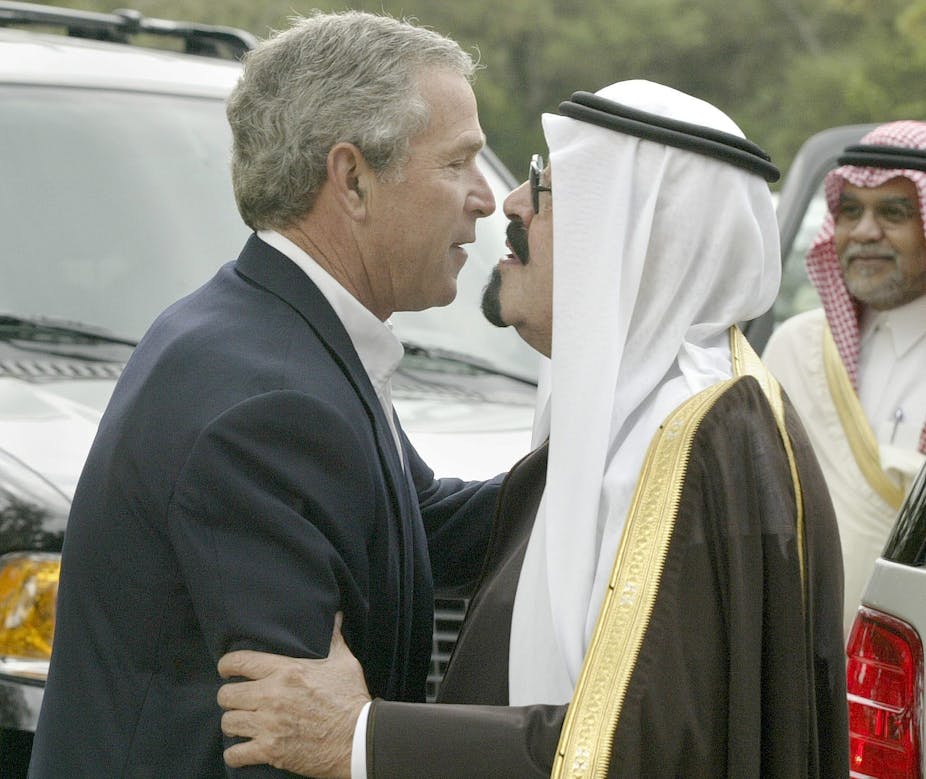International politics is no place for starry-eyed idealists at the best of times. But this week the leaders of what we used to know as the “free world” in the dark days of the Cold War have plumbed new depths of hypocrisy and cynicism.
We might have expected the passing of an hereditary ruler who ran one of the most brutal and repressive regimes on earth to have been a reason for quiet satisfaction if not outright celebration. We might have expected a chorus of Western leaders to call for generational change, the turning over of new leaves, and all of the other humbug that frequently accompanies such moments in less geopolitically critical parts of sub-Saharan Africa or Latin America.
What did we actually see? One Western leader after another queueing up to sing the praises of the recently departed Saudi monarch King Abdullah bin Abdulaziz Al Saud. US Secretary of State John Kerry led the praise, describing Abdullah as a visionary man of wisdom. Not to be outdone, like Tony Abbott in Australia, David Cameron ordered flags in Britain to be flown at half-mast and lauded the late king for his:
… commitment to peace and for strengthening understanding between faiths.
This is, of course, the same Saudi monarch who encouraged and exported a particularly virulent form of Wahhabism that wants to restore a form of pure monotheistic worship. Saudi Arabia is also consequently considered to be one of the drivers of the current wave of global terrorism. Let’s not forget that most the people who carried out the attacks of September 11 were from Saudi Arabia.
Of course, everyone knows that the the Saudi leadership is tolerated – even encouraged – because of its historical role as the world’s largest oil producer, as well as a supposedly reliable ally and force for stability in the Middle East. This argument was always debatable – if not actually debated – but could be explained by the apparent harmony of interests that existed between the US and the Saudis.
Conspiracy theorists have had a field day accounting for the otherwise inexplicably close connections between Saudi Arabia’s feudal, authoritarian, patriarchy and the Western world. From its inception, Saudi Arabia has enjoyed a symbiotic relationship with the US and its oil companies since the Americans granted formal recognition in 1931.
It is not necessary to buy into all of the numerous – and not entirely implausible – conspiracy theories that continue to swirl around the regimes of Bush junior and senior to recognise that the oil dynasties of North America and the Middle East might have something in common.
It is equally clear that successive American presidents have seen the Middle East generally and Saudi Arabia in particular as vital parts of a global chessboard upon which an energy-importing US remained highly exposed. Even America’s supposedly most indecisive and wimpy American president of recent times came up with the “Carter doctrine”, which reserved the right to use force in the Middle East to protect vital US interests there and ensure continuing supplies of energy.
In the context of an entirely cynical, self-serving calculation of the national interest, perhaps such grand strategising made sense. But does it any longer? After all, the US is now the world’s energy superpower. The shale oil and gas revolution has transformed the US’s energy position to such an extent that it is likely to become a major energy exporter and has already overtaken Saudi Arabia as the world’s largest oil producer.
The rationale for sucking up to the Saudis no longer looks quite so compelling – at least as far as their role as a reliable energy partner is concerned. One school of thought suggests that the Saudis are deliberately letting the oil price collapse in the short-term in order to drive marginal shale oil producers in the US out of business. With friends like these …
But what of Saudi Arabia’s supposedly vital strategic role? No doubt the British and French will want to continue cultivating good relations because the Saudi kingdom is one of the world’s most lucrative markets for expensive state-of-the-art weapons systems. It must be rather difficult to say from a grand strategic perspective whether it’s better or worse that the Saudis don’t actually get much use out of them.
Naïve empiricists, like me, might suggest that the last thing this part of the world needs is yet more weapons in the Middle East which may yet fall into the “wrong hands”.
Having supported one of the world’s most repressive regimes for so long, its Western sponsors now find themselves painted into a geostrategic corner. The installation of the geriatric, conservative, figure of King Salman, who may be exhibiting signs of dementia, cannot inspire confidence. That’s the problem with hereditary monarchies, I’m afraid.
Still, there is apparently no shortage of princes to choose from in the all-too-likely event that Salman doesn’t last long. One thing the Saudi aristocracy has been good at is reproducing itself. Abdullah had more than 20 children by at least ten different wives. Definitely something to be said for being one of the boys.
Despite Tony Blair praising Abdullah for his efforts to improve the lot of women, things aren’t quite so rosy for the girls. The late king actually kept four of his daughters imprisoned. Perhaps they wanted to learn to drive or something equally offensive. Look on the bright side, ladies: at least you weren’t publicly stoned to death.
The Middle East is synonymous with chaos and instability. But is this a good reason to support a regime that is the very antithesis of everything the West is supposed to stand for simply because it offers the – probably illusory – prospect of stability?
Is it any surprise so many young people in the Middle East – and closer to home, for that matter – are so deeply cynical and disconnected from political processes? I know how they feel.

